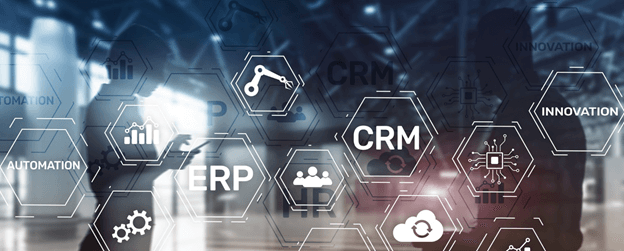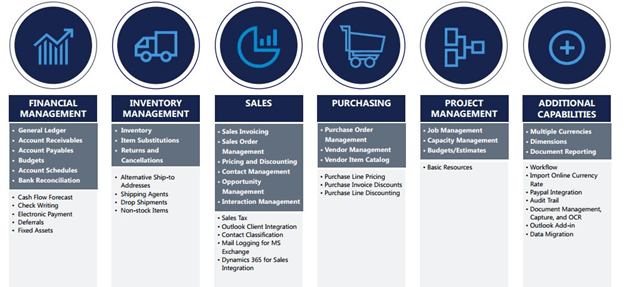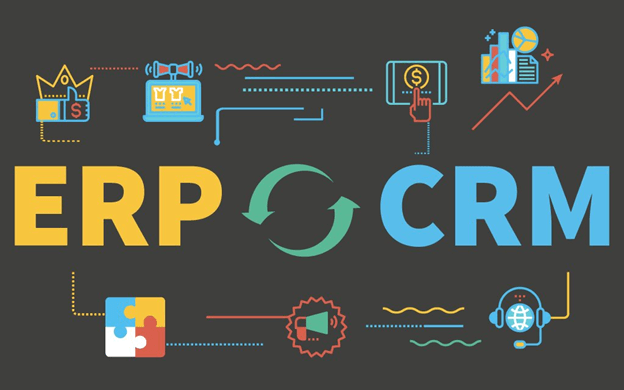
(Source)
The concepts of business strategy, planning, resource management, and the process of creating products or services are at the heart of almost all business operations today. Business procedures are now performed in a manner that has developed through time. From the management of inventory and order forecasting to human resource payroll and freight calculations, everything that is required to run a company is accessible with a few clicks. In essence, it allows you to run your company from one location, using one application, on one screen, from anywhere. Business processes like these become possible with CRM and ERP software solutions.
When it comes to CRM and ERP, the two serve as two sides of the same coin, two different limbs on the same tree, and two various components in the same vehicle. In this instance, the kind of tire varies due to the ERP being a versatile general-purpose tire. A CRM is similar to a snow tire. It is for a particular function and is applied specifically. ERP systems and Customer Relationship Management (CRM) software are pretty similar. The concepts described above imply that the two systems overlap to be merged with one other.

What Is ERP?
ERP is a strategic tool that organizations employ to combine the core functions of their enterprises. The importance of ERP software lies in its ability to streamline all of the business operations and integrate them into a single system. ERP software is used to combine a variety of functions like buying, inventory management, sales, marketing, finance, HR, and more.

(Source)
An ERP is a system that automates corporate operations to increase productivity and reduce the human handling of paper. For the most part, workers input all the relevant data into the ERP system, at which point a real-time, enterprise-wide snapshot is generated. With graphically displayed data, one will easily detect, intercept, and minimize harm to their business. Preventive planning enables departments to anticipate problems before they arise preemptively. An ERP (also known as enterprise resource planning) focuses on data instead of activities, and it is a technique for optimizing all company processes.
Since the early days of conventional software that used physical client servers, ERP solutions have been developed to utilize cloud-based software accessed remotely through the internet.
Benefits of ERP
ERP systems are very beneficial to businesses of all sizes. When it comes to managing your business, there are many advantages that your ERP application can provide, no matter how big or tiny your organization is.
Enhanced Management
ERP systems function as a central data repository where all business processes, including human resources, production, sales, customer support, inventory, and procurement, are linked. ERP software makes automated data handling quick and efficient because of computer technology. The lower likelihood of human mistakes in the manufacturing flow makes this advantage important. Data may be entered directly into the system without converting it to digital format, allowing human resources to be redeployed elsewhere.
Cost-Effective
The investment in ERP software is usually expensive, but it may lead to a more unified IT budget and better efficiency. An ERP system is more efficient because it eliminates the expenses associated with numerous systems that need specialized personnel, infrastructure, support teams, and licensing. ERP systems are modular in design to include many functional areas, such as customer resource management (CRM), accounting, human resources, and supply chain management. Using this, one utilizes the elements that are relevant to their requirements.
Credibility
This core perk in some way affects all the rest of the benefits on this list in terms of enterprise resource planning. ERP systems that provide efficient and centralized information collecting, processing, and storage are helpful in a company’s operations, such as production, sales, supply, and customers. So, rather than just several different databases, it is better to utilize and maintain a single system that handles all of the needs for recordkeeping.
Flexibility
Furthermore, the modular nature of ERP software means it may be scaled to current requirements and circumstances. This feature makes resource planning easier when companies grow or shrink at different levels.
The simple modifications, such as introducing new goods, employees, manufacturing facilities, suppliers, departments, and so on, all need advanced ERP systems. Thus, it can handle all such changes.
Market Rivalries
The main point is that ERP systems like NetSuite ERP offer enterprises a distinct competitive edge over their competitors. Many firms rely on tried-and-true techniques or cannot afford ERP systems, while others benefit from technology advancements and enjoy financial success.

What Is CRM?
Customer Relationship Management (CRM) is a technology used by companies to create, keep, and acquire customers.
To improve total profitability, this software is developed to guarantee every stage of contact with customer’s proceeds smoothly and effectively. Customer data is gathered through various channels by the program. CRM maintains the customer’s entire purchase history and specific information on personal data and buying behavior trends. Having a professional CRM in place is much simpler to discover new clients, build trust, offer competent assistance, and provide extra services.

Benefits of CRM
When companies engage in a new CRM strategy, there are many possible reasons. Reduced client loyalty, inefficient procedures, and inaccurate reporting are just a few of organizations’ challenges. Many advantages are derived from professionally integrated CRM systems for sales, marketing, service, and other teams.
Accurate and Trustworthy Information
Without data, the company would be far less functional, and there are many places to get it: social media, Google Analytics, business software, applications, and CRM systems. It’s not much use until data has been sorted, cleaned, evaluated, and made actionable. Your CRM software makes it possible to get deeper insights from all your data and analytics, even those obtained from external sources.
By preserving data integrity or using a CRM platform that keeps data error-free, you can efficiently process, tabulate, and categorize that data and then utilize reporting capabilities to understand the results. One of the most significant advantages of a CRM system is that it ultimately helps other features and perks of the system.
Automation
You may develop a more relevant, personalized message and outreach by continuing to gather and synthesize new data and insights into your audience, market, and industry. Dynamic content and automated messaging have the benefit of fast delivery and little effort. You may assemble various drip campaigns from individuals who share a commonality, such as a passion for a niche product.
The option to create separate automated emails that address an audience is available in many CRMs, and it’s beneficial since it enables you to build up a series of emails that speak to that audience and are automatically triggered by specified activities. Marketing techniques known as drip campaigns may be utilized across the sales funnel.
Relationship with Customers
A CRM’s primary function is to help businesses engage consumers. The main benefit of a CRM system like Microsoft Dynamics 365 is that it allows companies to understand their consumers better. CRM ensures a single truth about each connection available through a consistent interface regardless of where customers or customers’ customers are working. A good solution will often be sought to replace an application, spreadsheet, file, or customer data that is no longer accessible to the individual who needs it.
While sometimes CRM will connect to external data sources like accounting systems and websites to obtain information across every touchpoint, other times CRM will join to third-party data sources like those listed above to collect comprehensive contact information from every point of interaction.
Work from Anywhere
CRM technology enables employees to perform their job wherever they are. There are productivity solutions for on-the-go and at-work situations that assist in the process and business connections relevant to you. Staff equipped with CRM can quickly respond to clients’ requests, pick up leads, and deal with current customers.

ERP VS CRM SYSTEM
In addition to using various techniques to improve profitability, CRM and ERP systems have diverse methods. ERP brings in automation to reduce overheads and decrease expenses. The ERP minimizes the amount of capital spent on company operations by making them more efficient. While a CRM aims to boost revenues by increasing sales volume, a CRM also increases profits by improving sales performance. CRM saves customer data for all stakeholders, such as the business CEO or a sales representative, enhancing customer interactions and increasing customer loyalty, thereby boosting the firm’s profitability and market share.
CRM success indicators focus upon acquiring and retaining customers, and that helps businesses to make more money. ERP’s metrics may be used across many company departments, including accounting, invoicing, order procurement, vendor management, delivery delays, and more. ERP’s failure metrics concern only the accounting department. ERP systems may increase profits by reducing expenses associated with operations and overhead. CRM systems increase the size of client bases, which results in increases in sales and service volume.
Similarity between ERP & CRM
Both ERP and CRM use relational databases to store and analyze data. With a conventional on-premises approach, delivery is made through on-premises software. Alternatively, SaaS delivery uses cloud-based software, in which the vendor takes care of running the program in its data center while consumers use it from the cloud.

Do You Need Both CRM and ERP?
The ERP/CRM argument is irrelevant for all practical purposes since you may use ERP or CRM software to meet your specific needs. In that case, you would only need a new CRM system if you’re primarily concerned with sales and marketing processes and you’re happy with the current software for operations like accounting and HR. Alternatively, if you are growing your company or need to revamp all of the various software types your firm is utilizing, it would be in your best interest to consider investing in a new ERP system.
Your company’s magnitude, size, and complexity will have the most influence on your ERP and customer relationship management (CRM) installation. Process streamlining ensures many elements of operating a company operate more smoothly. ERP coupled with CRM enables every employee to keep up-to-date, informed, and cost-effective while enjoying a multitude of additional benefits such as;
· Enhanced data-backed decision-making
· Increased market intelligence
· Potential for automation that has not been unlocked
· More ease in communication and collaboration
· On-the-ball resource allocation
ERP and CRM Integration
As more businesses see the advantages of both customer relationship management (CRM) and Enterprise Resource Planning (ERP) in day-to-day company operations, more companies have adopted them. While it is true that most CRM and ERP applications would turn into data silos unless used in tandem, companies that only use CRM or ERP applications are failing to get a complete 360-degree picture of their customers. ERP and CRM systems that fail to communicate effectively may do more harm than good to a company’s operations. For example, if your sales staff aren’t using linked systems, they won’t know about a customer’s credit limit, and in turn, they’ll provide credit to someone who shouldn’t have it. To see how poor ERP and CRM implementation may adversely affect day-to-day operations or lead to missed good possibilities, examine comparable instances.

(Source)
Indeed, combining ERP with CRM offers many advantages, including productivity improvements and profitability for the business. As a personal preference, I believe that integrating divisions ensures that all business functions can collaborate efficiently.

Common Functions of ERP
The various functions that top-of-the-line ERP systems like NetSuite ERP offer are as listed below:
Accounts
ERP systems were first developed to provide accounting functions. No matter how sophisticated the choices and capabilities of an ERP system, there will always be a significant focus on money management in all business ERP implementations. To best manage and monitor numbers—both now and throughout time, you should combine your heritage and current accounting software. It also helps you better understand the data by organizing it in ways that enable you to go deeper.
HR Administration
Today’s ERP software aids you in better using your company’s data to assist you in running your business more efficiently. When you can keep track of time, calculate payroll, analyze performance, and investigate metrics, you will be able to identify your top performers, recognize success, and discover HR issues.
Relationships Management with Customers
By using enterprise resource planning software, you may learn about your customer connections, including those of your customers’ potential competitors. Orders may be placed more quickly, and tracking your response time is simple. While volumes for various clients over time will also be significant, sales personnel should primarily use them to direct their efforts more efficiently.

Common Functions of CRM
Prospect Evaluation
Lead prospect activity may be tracked by CRM software that utilizes click-through and conversion tracking from affiliate marketing advertisements, links in emails, and website forms.
Customer-Tracking
CRM software will keep track of details such as the goods customers have bought, the dates they purchased them, the number of salespeople engaged, purchase costs, and so on.
Reports
When data is pooled and presented in reports, CRM software systems are valuable for answering marketing queries.
Service Tracking
CRM systems often contain information that supports the company’s customer care personnel. To provide representative access to client purchase and service contract data, product information, the system will create a customized workflow that allows representatives to go directly to that data.
FAQS
Is ERP better than CRM?
To optimize business development, companies require a CRM and an ERP system. Sales are increased and company operations are facilitated by those revenues. An ERP system then optimizes these business operations. It relies totally on the demand of the firm. You may always integrate, though, and have both. As far as ERP vs CRM market size is concerned, ERP leads the way, with its market value expected to exceed $80billion by 2025.
Is CRM part of ERP?
Some ERP systems include CRM components in their algorithms. However, CRM software’s do not have ERP systems within them.
What is ERP & CRM?
ERP connects financial and operational systems to a single database, whereas CRM manages consumer interactions.
What is CRM and how does it differ from ERP?
ERP is generally used for financial data and the finance department, whereas CRM is utilized by the sales and customer care departments to collect and organize client information.

Conclusion
ERP is a holistic approach that unites company operations from the front and back office, while CRM is specifically designed to target sales, marketing, and customer interactions. It all depends on what you need from your company and what level of investment you are prepared to put in. ERP-CRM interactions, data warehousing, analytics, and other business necessities are required for both parts of your company. As a result, choose software providers with substantial ERP systems that easily connect with your current CRM.
